Master of Science Biotechnology
The Trinational Biotechnology Programme is co-ordinated by the Upper Rhine universities of Freiburg, Basel and Strasbourg. Students from all over the world can obtain an interdisciplinary training in the field of Biotechnology.
The students spend most of their time in the École Supérieure de Biotechnologie de Strasbourg (ESBS), which belongs to the Université de Strasbourg. Almost all lectures take place there, including those held by the instructors from Freiburg and Basel. The language of instruction is generally in English.
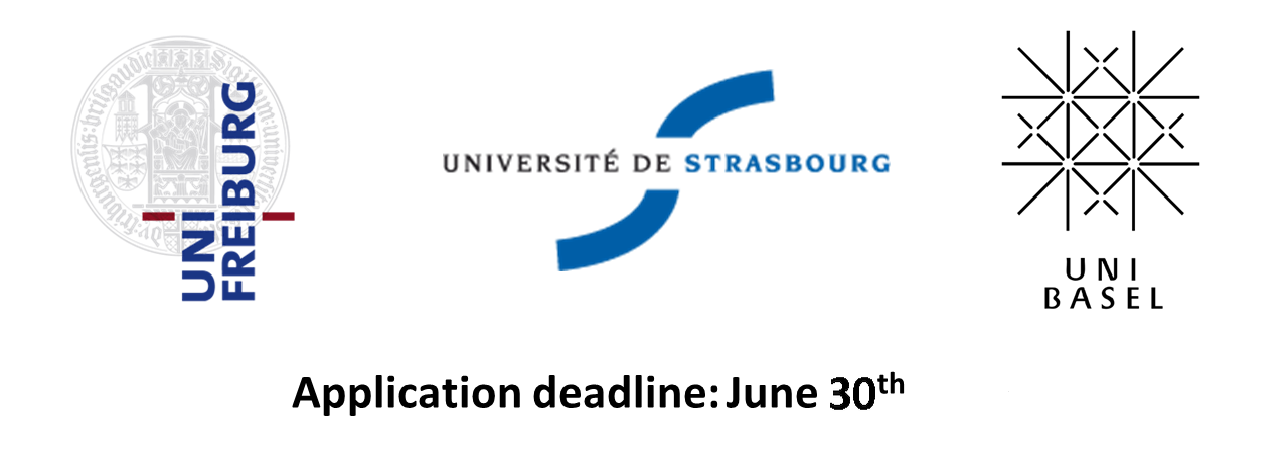
Content
The goal of biotechnology is to develop technical methods that make use of biological processes. Thus, biotechnology is an interdisciplinary science, drawing from advances in Biology, Chemistry and Engineering. Examples of biotechnological methods long in use are beer brewing and cheese production. Today, biotechnology covers a wide area, including biological processes involved in pharmaceutical technology, energy production or production of foodstuffs. The Biological aspect supplies basic knowledge from the medical, molecular biological, microbiological and botanical fields. The Chemical aspect delivers important findings for development from biochemistry and analytical chemistry. Finally, principles of applied Engineering enable the building of production processes.
Organization and Degrees
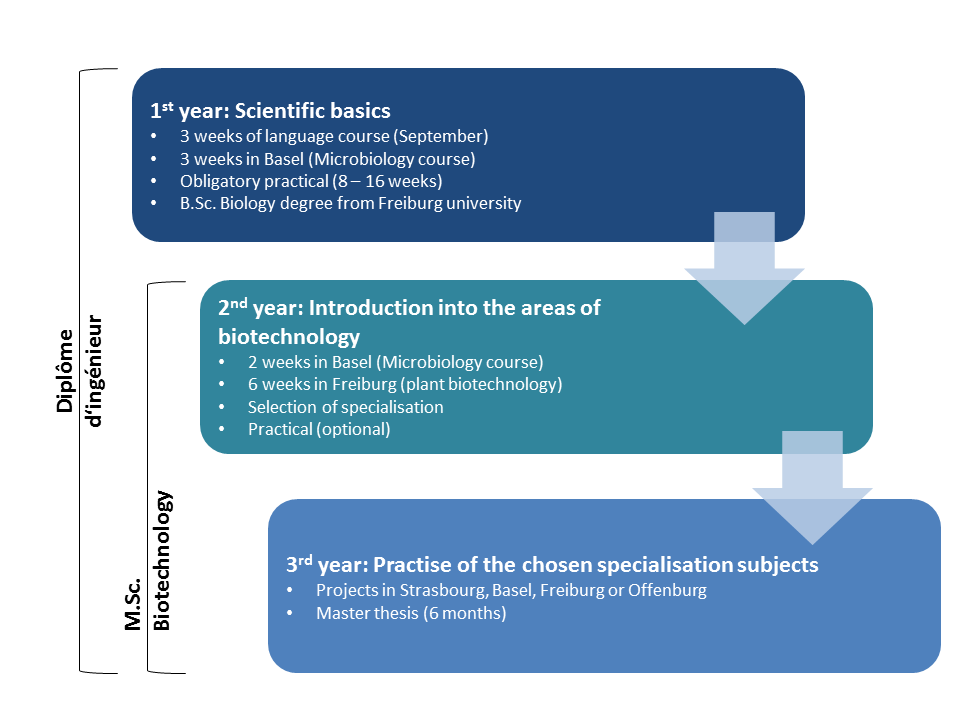
Those who have completed at least four semesters of an undergraduate degree at any university, and register in Freiburg can obtain a B.Sc. in Biology after two semesters of work at the ESBS. After a four-semester Master’s programme, one can obtain an M.Sc. in a chosen core area of Biotechnology. Concurrently, it is also possible to obtain the “Diplôme d’Ingénieur en Biotechnologie” degree.
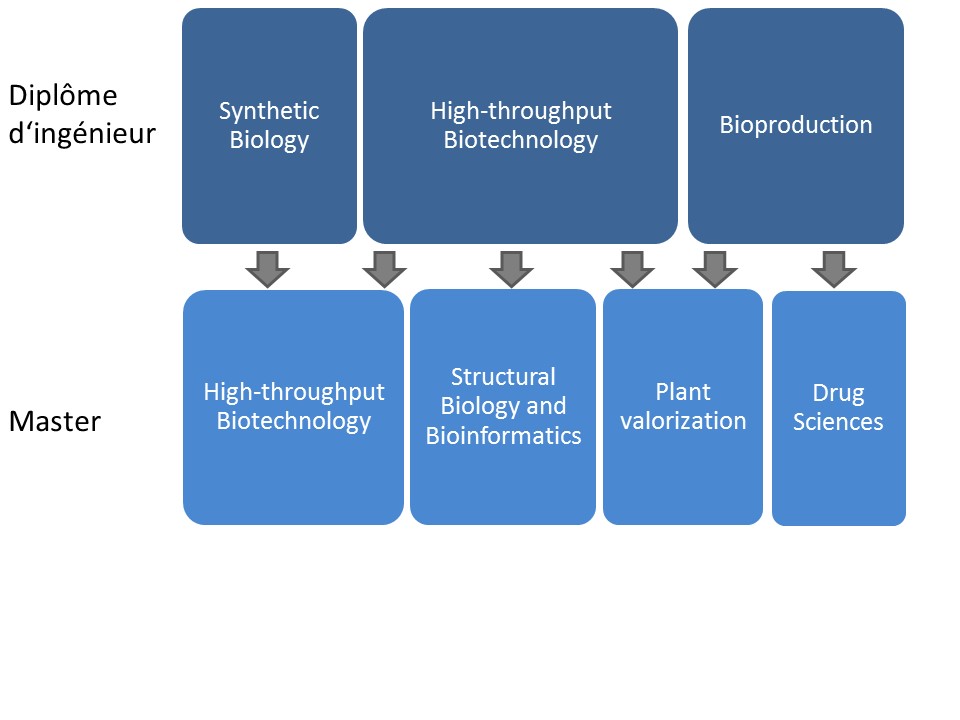
Integration into Industry
During the programme there are various possibilities to make contact with potential employers. The ESBS supervisory board includes representatives of biotechnological enterprises who participate in curriculum design. Practical work plays a significant role in this programme. Aside from the labs that accompany the lectures, there are at least 14 weeks of external internships integrated into the curriculum. The programme concludes with an eight-month Master’s project undertaken in either an industrial or academic research lab of choice from around the world.
Parts of the courses, largely practical work, are taught as blocks in Basel and Freiburg. The students spend from two to six weeks for each course at the participating university, which also organizes the accomodation. The Bachelor’s and Master’s projects will be undertaken at either a university or in industry.
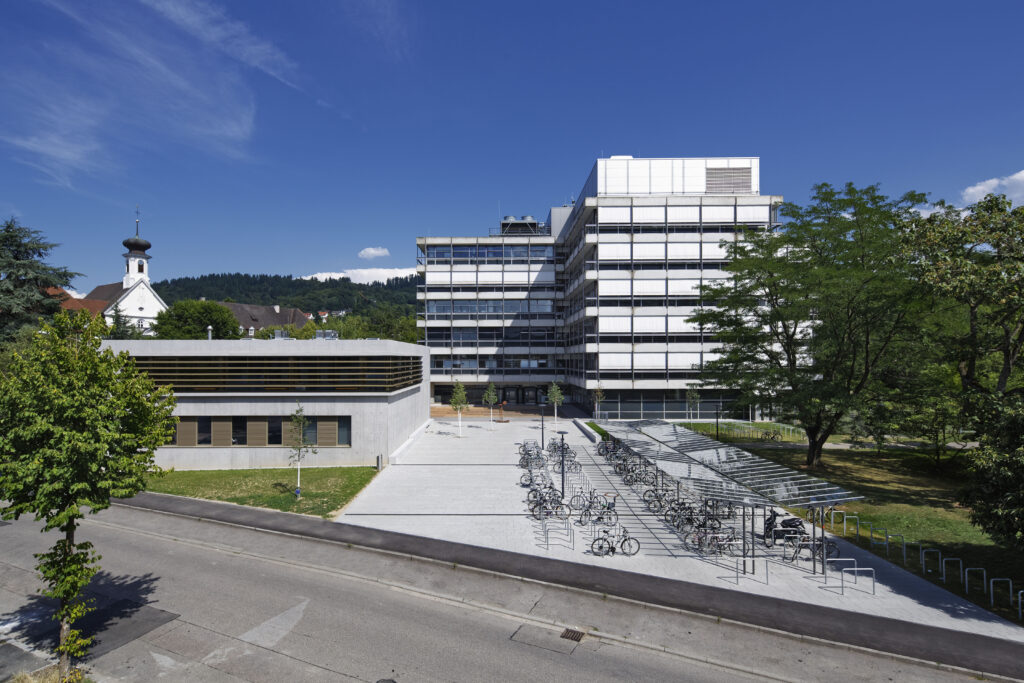
Career Outlook
Career paths for graduates of the programme can be in research and development in industry (e.g. pharmaceutical, foodstuffs, plant construction and environmental technology) and in all areas of biotechnology in academia. Entry-level positions could be in the production, research and development, product and process development or bioinformatic sectors. Another possibility is an advisory and administrative position in the respective agencies and ministries to address issues about international development programmes, applied technologies, environmental problems or resource security. Finally, the path to PhD studies is also open.
Numerous internships and seminars from company representatives give ESBS students the opportunity to establish contacts to Industry, besides those at the University. The ESBS has an active alumni association, which maintains contact between the ESBS and former students. Thus, there are plenty of people to contact who are already working through their career. Alumni day takes place once per year, where former ESBS students travel to Strasbourg and recount their experiences.
The Master of Science degree and the French “Diplôme d’Ingénieur en Biotechnologie” are recognized internationally. It provides for a rapid entry into the job market or into PhD studies. ESBS graduates can be found around the world in many interesting paths, such as research and development, management, quality assurance and training.
Strasbourg
For over 20 years, the ESBS (Ecole Supérieure de Biotechnologie de Strasbourg) offers the trinational programme and facilitates the award of Diplôme d’Ingénieur en Biotechnologie through the Commission des Titres d’Ingénieur.
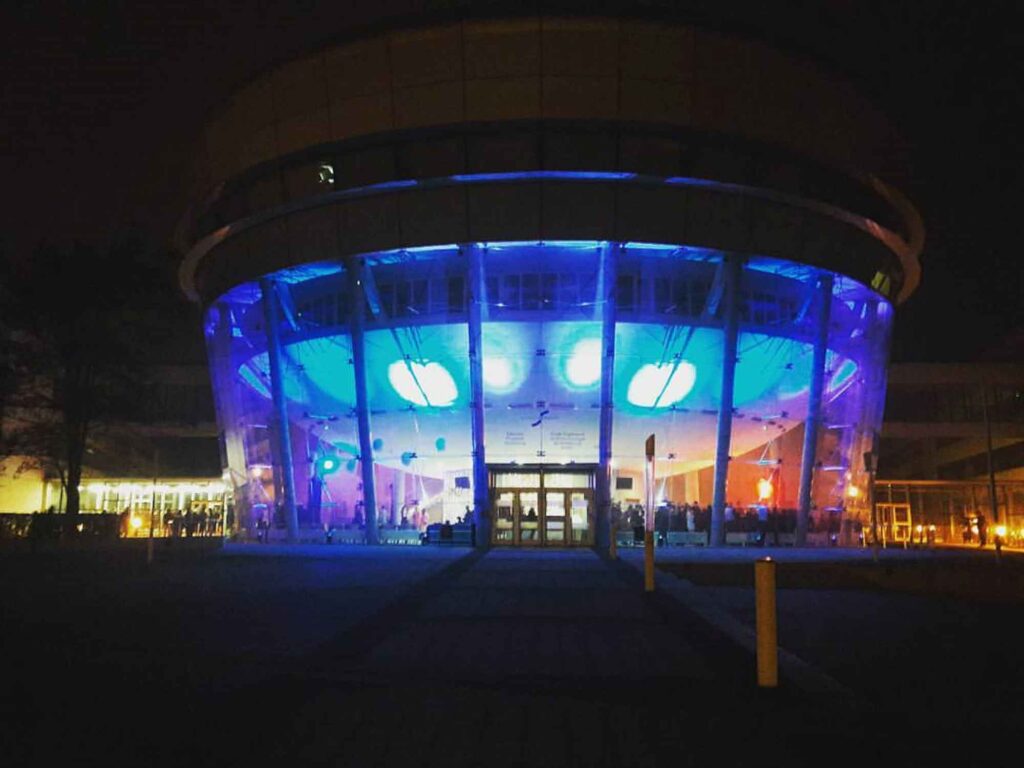
In addition, since 2014 a co-operation with the ECPM (Ecole européenne de Chimie, Polymères et Matériaux) awards the Diplôme in Chemistry and Biology – the first of its kind in France.
The Illkirch campus of the ESBS is the principal location for lectures. This campus is south of Strasbourg in the Pôle d’Innovation, surrounded by internationally active biotechnological enterprises.
The goal of the ESBS is the three-year training of engineering skills in the various fields of modern biotechnology and career preparation into the health and environmental industry, including their phases of research, development and production.
The bioengineering training includes a solid base in natural sciences and engineering, with introduction to business, presentation skills and language.
Freiburg
The University of Freiburg is one of the oldest in Freiburg, and ranks among the top universities according to German media, such as “die Zeit”. Aside from administration of the German students in the programme, the University of Freiburg runs lectures and practical work in plant physiology. In such a course, the students stay in Freiburg for about six weeks in their second year of studies.

Basel

The interdisciplinary Biozentrum is the largest department of natural sciences at the University of Basel. Its focus is fundamental research in molecular biology and biomedicine and the accompanying teaching. The Biozentrum takes a leading national and international role, and is well networked with academic and industrial partners. The lectures and practical work in microbiology take place here.
Offenburg
The University of Offenburg enjoys an excellent reputation in the field of process engineering which researches the automatic control and optimization of biotechnological processes. The students profit from individual supervision by teachers and from comprehensive services as well as close relations to the local industry. In Offenburg two core elective courses take place for a total of 8 weeks.
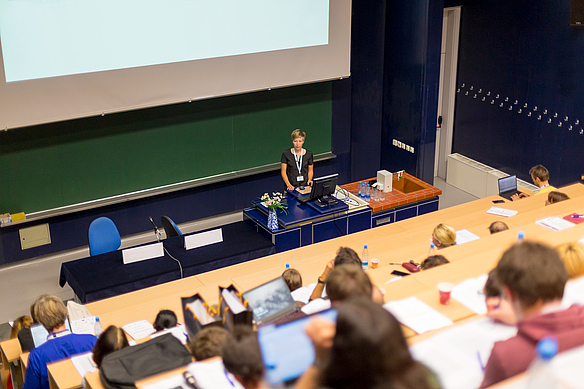
Students
The graduating class size of 40 students ensures individual attention by the instructors, so that one stays within the study limit of six semesters. This personalized atmosphere promotes development of soft skills such as communication, team work, a sense of responsibility and interpersonal skills. Additionally, the constant contact among various nationalities facilitates communication in the different languages and leads to an more open attitude towards strangers and foreigners, so that graduates today are active around the world.
Student Club
The Amicale is the student club of the biotechnology programme. The events that they promote, organize and finance play a part in student life. Furthermore, the Amicale and delegates of each graduating class keep in contact with the administration and instructors.
Together with the Télécom PC student office they also take care of the welcome and orientation of each year’s first-semester students. The established mentoring system also plays a big role. This persists over generations, and provides for the inclusion of first-semester students into a “family”. This family plays a role during orientation and studies through helpful tips and sharing of experiences.
In addition, they organize social evenings in the student lounge, sport outings and special events for St. Nicholas Day, Valentine’s Day or great weather. The student lounge is right on campus and is composed of a large hall with kitchen and bar, a games room, a workout gym, a room for music practice, a laundromat and toilets. It has about everything a student needs, aside from the University.
Professors
All three partner universities send instructors out to the ESBS. For this reason, almost all lectures are in Strasbourg, with the exception of certain practical courses.
NGB
Die “Nouvelle Génération des Biotechnologistes (NGB)” vereint Studierende und junge Wissenschaftler der Biotechnologie.
Die NGB organisiert regelmäßg Vorträge, Diskussionsrunden und Führungen in Instituten oder Unternehmen. Dabei bilden die Studierende der ESBS einen großen Teil des Vorstandes der NGB.
Prerequisites for your application
If you want to start already in the specialization phase of your Bachelor studies (third year):
Four semesters of study (120 ECTS) in a life science programme and certified German C1 level and English B2 level (certification not necessary if you have the German Abitur or Austrian/Swiss Matura)
If you already have a BSc. or an equivalent training:
- Completed BSc in a life science related programme or
- Two-year preparation for a French engineering school or
- Diplôme universitaire de technologie or
- Brevet de technicien supérieur en France
plus certified English B2 level (e.g. through Abitur/Matura)
Criteria
The decisive factors for admission are the application documents and an interview at the University of Freiburg. To apply students must demonstrate that they will complete at least four semesters or 120 ECTS points in a biological field of study. Consideration will be given also to students from the engineering or natural science fields.
Application Documents:
- Application form
- Resumé in tabular format
- Copies of the high-school diploma, semester exam results, and the BSc. diploma or a certificate of upcoming graduation and accordingly the amount of ECTS points to be attained by the fall semester (transcript of records will be sufficient).
Procedure
- Please send the completed application, by 30 June via E-Mail to trinat@biologie.uni-freiburg.de
- If you meet the prerequisites, you will be invited by E-mail to interview in Freiburg.
- A few days thereafter you will receive notice whether you would be admitted.
- We request that you respond in writing within a week whether you accept the offer to join the programme.
- Thereupon, you will receive a welcome package containing the important information about the beginning of studies at the ESBS. It contains much practical aid, for example apartment searching.
Immediately before the regular classes, mandatory intensive English and French language courses will take place. The language courses commence in the first week of September. The regular lectures generally begin at the end of September.
Downloads
-
Poster: Trinationaler Studiengang Biotechnologie (deutsch, PDF, 1.3MB)
-
Introductory presentation of the Master programme (deutsch, PDF, 1.7MB)
-
Admission regulations (deutsch, PDF, 93kB)
-
Examination regulations (deutsch, PDF, 122kB)
-
Curriculum (PDF, 117kB)
-
Application form (deutsch, PDF, 59kB)
Links
-
Homepage of the programme at the university of Strasbourg
-
Homepage of the programme at the university of Freiburg
-
Homepage of the university of Applied Sciences Offenburg
-
Homepage of the Biozentrum at the University of Basel
-
Homepage of the “Nouvelle Génération des Biotechnologistes” (NGB)
-
Homepage of the students representation Amicale at the ESBS
-
Homepage of the alumni association of the ESBS